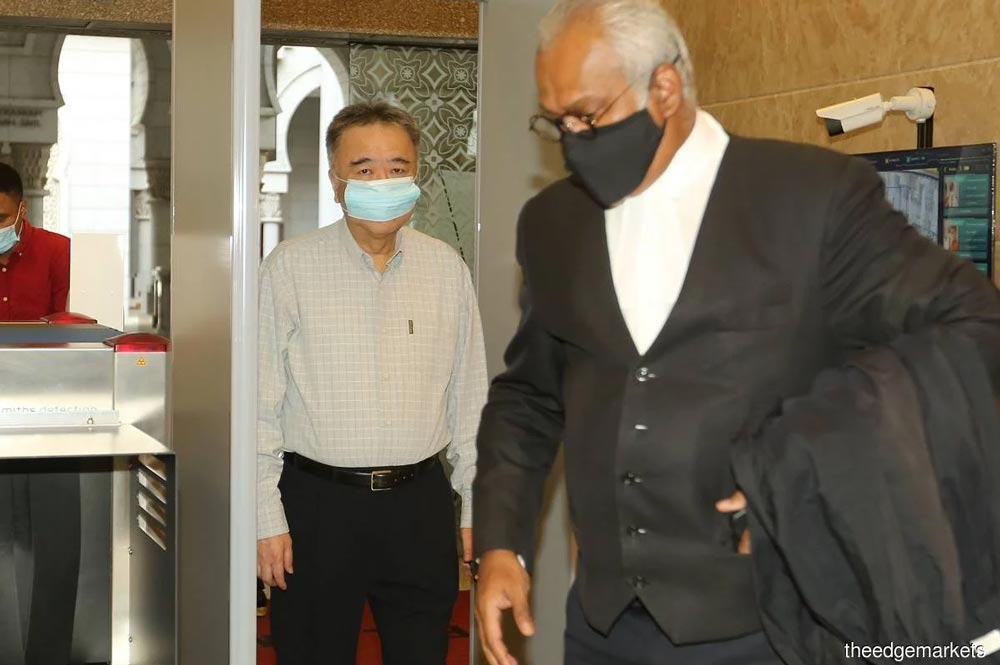By Hafiz Yatim | The Edge Markets

The High Court on Thursday (Oct 13) was told that the Sessions Court judge, who convicted former Repco Holdings Bhd Chairman Low Thiam Hock of market manipulation, had misdirected himself in not considering Low’s expert defence witness testimony, which had purportedly managed to rebut the prosecution or the Securities Commission Malaysia’s (SC) expert witness testimony.
Counsel Edmund Bon, representing Low, said the defence witnesses that comprised Australian Dr Michael Aitken had described that it was not market manipulation as alleged by the prosecution, but only averaging-in of Repco shares.
He further said there was no rebuttal of this issue by the prosecution, and the Sessions Court judge had failed to take this argument into consideration, and did not address that in his judgement in convicting Low.
“If one were to look at the Sessions Court judge’s decision, there was no mention or reference at all to Aitken’s testimony, who was the expert defence witness on this issue who had done a comparative study.
“Surely, in any judgement, there should be reference to the expert defence witness testimony, but the trial judge only chose to adopt the prosecution’s expert witness testimony by Dr Neoh Soon Kean, who did not do a comparative study. The judge failed to appreciate the facts as laid by Aitken, who had managed to rebut the allegation of manipulation,” Bon said.
Bon, who appeared with Joshua Tay, New Sin Yew, and Chan Yen Hui, said Neoh was saying that he assumed Repco’s share price would have dropped in line with the stock market (the second board index), and thus there was manipulation when the share price held up.
“He based this on nothing else but how the other stocks fared. This was not sufficient to prove manipulation. Aitken provided a more comprehensive technical analysis by looking at a longer period, comparing Repco’s share price to its past record, checked for prices the trades were done to see if they were at best and fair prices, and the aggressiveness of the trades done.
“The Sessions Court was wrong to have dismissed Aitken’s evidence and convicting Low,” Bon added.
Averaging-in is buying more shares at a lower price than what one previously paid, and according to the events, Low purchased the shares at 11.39am on Dec 3, 1997, in a bid to prevent the share price from falling further.
Aitken, meanwhile, is the founder of SMARTS Group, the maker of a real-time market surveillance system used by Bursa Malaysia.
Low, 60, was convicted under section 84(1) of the Securities Industry Act 1983 of carrying out acts calculated to create a misleading appearance, with respect to the price of Repco shares on the Kuala Lumpur Stock Exchange on Dec 3, 1997.
For this, he was sentenced by the Sessions Court in 2016 to five years’ jail and fined RM5 million, which he is presently appealing against.
Low was initially acquitted without his defence being called, and the decision was upheld by the High Court. But the Court of Appeal reversed the decision and ordered him to enter his defence, and the trial resumed in the Sessions Court that resulted in his conviction.
Bon further said that through Aitken, the defence had shown that 64% of the purchases of Repco shares were buyer-initiated (taking the seller), and 36% seller-initiated.
The order book that was reconstructed by Aitken purportedly showed many seller offers (in red in replay) not taken up by Low’s dealer.
‘Purchase made as PM called to support market’
The charge of market manipulation, Bon added, requires the prosecution to prove 100% of the purchases were buyer-initiated, which means all the red in replay had to be mopped up by Low’s dealer, but it was not the case.
Meanwhile, senior lawyer Tan Sri Muhammad Shafee Abdullah, who also appeared for Low, said that his client only wanted to prevent his controlling stake from diminishing.
“Furthermore, the purchase was made at slightly after 1130am that day. If he wanted to manipulate, he would have started early in the morning, and not waited until 1130am.
“This was further explained by Low when he gave his testimony,” the senior lawyer said.
Shafee further said the Sessions Court judge was wrong to consider Low’s defence as merely an afterthought, as his client had said that he was heeding the then prime minister’s call to support the market.
For this reason, the lawyer said the trial judge had misappreciated the facts of the case, and Low’s appeal should be allowed.
The prosecution from the SC led by Shoba Venu Gobal asked that she be given time to reply, as the defence had taken two days to submit on the matter.
Following this, judicial commissioner Datuk Azhar Abdul Hamid fixed Nov 2 and 3 for the prosecution’s reply to the defence, and the defence’s reply if any.



